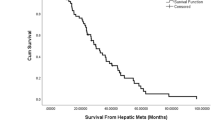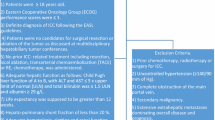Abstract
Purpose
Transarterial radioembolization (TARE) is a liver-directed treatment for unresectable intrahepatic cholangiocarcinoma (ICC). The aim of this study is to evaluate factors affecting outcomes of TARE in heavily pretreated ICC patients.
Methods
We evaluated pretreated ICC patients who received TARE from January 2013 to December 2021. Prior treatments included systemic therapy, hepatic resection, and liver-directed therapies, including hepatic arterial infusion chemotherapy, external beam radiation, transarterial embolization, and thermal ablation. Patients were classified based on history of hepatic resection and genomic status based on next-generation sequencing (NGS). The primary endpoint was overall survival (OS) after TARE.
Results
Fourteen patients with median age 66.1 years (range, 52.4–87.5), 11 females and 3 males, were included. Prior therapies included systemic in 13/14 patients (93%), liver resection in 6/14 (43%), and liver-directed therapy in 6/14 (43%). Median OS was 11.9 months (range, 2.8–81.0). Resected patients had significantly longer median OS compared to unresected patients (16.6 versus 7.9 months; p = 0.038). Prior liver-directed therapy (p = 0.043), largest tumor diameter > 4 cm (p = 0.014), and > 2 hepatic segments involvement (p = 0.001) were associated with worse OS. Nine patients underwent NGS; 3/9 (33.3%) and had a high-risk gene signature (HRGS), defined as alterations in TP53, KRAS, or CDKN2A. Patients with a HRGS had worse median OS (10.0 versus 17.8 months; p = 0.024).
Conclusions
TARE may be used as salvage therapy in heavily treated ICC patients. Presence of a HRGS may predict worse OS after TARE. Further investigation with more patients is recommended to validate these results.
Graphical abstract



Similar content being viewed by others
References
Banales JM, Marin JJG, Lamarca A, Rodrigues PM, Khan SA, Roberts LR, et al. Cholangiocarcinoma 2020: the next horizon in mechanisms and management. Nat Rev Gastroenterol Hepatol. 2020;17(9):557-88.
Shaib Y, El-Serag HB. The epidemiology of cholangiocarcinoma. Semin Liver Dis. 2004;24(2):115-25.
Wu L, Tsilimigras DI, Paredes AZ, Mehta R, Hyer JM, Merath K, et al. Trends in the Incidence, Treatment and Outcomes of Patients with Intrahepatic Cholangiocarcinoma in the USA: Facility Type is Associated with Margin Status, Use of Lymphadenectomy and Overall Survival. World J Surg. 2019;43(7):1777-87.
Smart AC, Goyal L, Horick N, Petkovska N, Zhu AX, Ferrone CR, et al. Hypofractionated Radiation Therapy for Unresectable/Locally Recurrent Intrahepatic Cholangiocarcinoma. Ann Surg Oncol. 2020;27(4):1122-9.
Konstantinidis IT, Groot Koerkamp B, Do RK, Gonen M, Fong Y, Allen PJ, et al. Unresectable intrahepatic cholangiocarcinoma: Systemic plus hepatic arterial infusion chemotherapy is associated with longer survival in comparison with systemic chemotherapy alone. Cancer. 2016;122(5):758-65.
Kim JH, Won HJ, Shin YM, Kim KA, Kim PN. Radiofrequency ablation for the treatment of primary intrahepatic cholangiocarcinoma. AJR Am J Roentgenol. 2011;196(2):W205-9.
Kim JH, Won HJ, Shin YM, Kim PN, Lee SG, Hwang S. Radiofrequency ablation for recurrent intrahepatic cholangiocarcinoma after curative resection. Eur J Radiol. 2011;80(3):e221-5.
Hyder O, Marsh JW, Salem R, Petre EN, Kalva S, Liapi E, et al. Intra-arterial therapy for advanced intrahepatic cholangiocarcinoma: a multi-institutional analysis. Ann Surg Oncol. 2013;20(12):3779-86.
Wang J, Xue Y, Liu R, Wen Z, Ma Z, Yang X, et al. DEB-TACE with irinotecan versus C-TACE for unresectable intrahepatic cholangiocarcinoma: a prospective clinical study. Front Bioeng Biotechnol. 2022;10:1112500.
Schartz DA, Porter M, Schartz E, Kallas J, Gupta A, Butani D, et al. Transarterial Yttrium-90 Radioembolization for Unresectable Intrahepatic Cholangiocarcinoma: A Systematic Review and Meta-Analysis. J Vasc Interv Radiol. 2022;33(6):679-86.
Edeline J, Touchefeu Y, Guiu B, Farge O, Tougeron D, Baumgaertner I, et al. Radioembolization Plus Chemotherapy for First-line Treatment of Locally Advanced Intrahepatic Cholangiocarcinoma: A Phase 2 Clinical Trial. JAMA Oncol. 2020;6(1):51-9.
Ahmed O, Yu Q, Patel M, Hwang G, Pillai A, Liao CY, et al. Yttrium-90 Radioembolization and Concomitant Systemic Gemcitabine, Cisplatin, and Capecitabine as First Line Therapy for Locally Advanced Intrahepatic Cholangiocarcinoma. J Vasc Interv Radiol. 2022.
Gupta AN, Gordon AC, Gabr A, Kalyan A, Kircher SM, Mahalingam D, et al. Yttrium-90 Radioembolization of Unresectable Intrahepatic Cholangiocarcinoma: Long-Term Follow-up for a 136-Patient Cohort. Cardiovasc Intervent Radiol. 2022;45(8):1117-28.
White J, Carolan-Rees G, Dale M, Patrick HE, See TC, Bell JK, et al. Yttrium-90 Transarterial Radioembolization for Chemotherapy-Refractory Intrahepatic Cholangiocarcinoma: A Prospective, Observational Study. J Vasc Interv Radiol. 2019;30(8):1185-92.
Boerner T, Drill E, Pak LM, Nguyen B, Sigel CS, Doussot A, et al. Genetic Determinants of Outcome in Intrahepatic Cholangiocarcinoma. Hepatology. 2021;74(3):1429-44.
Zou S, Li J, Zhou H, Frech C, Jiang X, Chu JS, et al. Mutational landscape of intrahepatic cholangiocarcinoma. Nat Commun. 2014;5:5696.
Lewandowski RJ, Sato KT, Atassi B, Ryu RK, Nemcek AA, Jr., Kulik L, et al. Radioembolization with 90Y microspheres: angiographic and technical considerations. Cardiovasc Intervent Radiol. 2007;30(4):571-92.
Salem R, Thurston KG. Radioembolization with yttrium-90 microspheres: a state-of-the-art brachytherapy treatment for primary and secondary liver malignancies: part 3: comprehensive literature review and future direction. J Vasc Interv Radiol. 2006;17(10):1571-93.
Salem R, Padia SA, Lam M, Bell J, Chiesa C, Fowers K, et al. Clinical and dosimetric considerations for Y90: recommendations from an international multidisciplinary working group. Eur J Nucl Med Mol Imaging. 2019;46(8):1695-704.
Cheng DT, Mitchell TN, Zehir A, Shah RH, Benayed R, Syed A, et al. Memorial Sloan Kettering-Integrated Mutation Profiling of Actionable Cancer Targets (MSK-IMPACT): A Hybridization Capture-Based Next-Generation Sequencing Clinical Assay for Solid Tumor Molecular Oncology. J Mol Diagn. 2015;17(3):251-64.
Eisenhauer EA, Therasse P, Bogaerts J, Schwartz LH, Sargent D, Ford R, et al. New response evaluation criteria in solid tumours: revised RECIST guideline (version 1.1). Eur J Cancer. 2009;45(2):228-47.
Common Terminology Criteria for Adverse Events (CTCAE) Version 5.0 2017 [Available from: https://ctep.cancer.gov/protocoldevelopment/electronic_applications/docs/ctcae_v5_quick_reference_5x7.pdf.
Paz-Fumagalli R, Core J, Padula C, Montazeri S, McKinney J, Frey G, et al. Safety and initial efficacy of ablative radioembolization for the treatment of unresectable intrahepatic cholangiocarcinoma. Oncotarget. 2021;12(20):2075-88.
Helmberger T, Golfieri R, Pech M, Pfammatter T, Arnold D, Cianni R, et al. Clinical Application of Trans-Arterial Radioembolization in Hepatic Malignancies in Europe: First Results from the Prospective Multicentre Observational Study CIRSE Registry for SIR-Spheres Therapy (CIRT). Cardiovasc Intervent Radiol. 2021;44(1):21-35.
Kohler M, Harders F, Lohofer F, Paprottka PM, Schaarschmidt BM, Theysohn J, et al. Prognostic Factors for Overall Survival in Advanced Intrahepatic Cholangiocarcinoma Treated with Yttrium-90 Radioembolization. J Clin Med. 2019;9(1).
Buettner S, Braat A, Margonis GA, Brown DB, Taylor KB, Borgmann AJ, et al. Yttrium-90 Radioembolization in Intrahepatic Cholangiocarcinoma: A Multicenter Retrospective Analysis. J Vasc Interv Radiol. 2020;31(7):1035-43 e2.
Bargellini I, Mosconi C, Pizzi G, Lorenzoni G, Vivaldi C, Cappelli A, et al. Yttrium-90 Radioembolization in Unresectable Intrahepatic Cholangiocarcinoma: Results of a Multicenter Retrospective Study. Cardiovasc Intervent Radiol. 2020;43(9):1305-14.
Robinson TJ, Du L, Matsuoka L, Sze DY, Kennedy AS, Gandhi RT, et al. Survival and Toxicities after Yttrium-90 Transarterial Radioembolization of Cholangiocarcinoma in the RESiN Registry. J Vasc Interv Radiol. 2022.
Riby D, Mazzotta AD, Bergeat D, Verdure L, Sulpice L, Bourien H, et al. Downstaging with Radioembolization or Chemotherapy for Initially Unresectable Intrahepatic Cholangiocarcinoma. Ann Surg Oncol. 2020;27(10):3729-37.
Mosconi C, Gramenzi A, Ascanio S, Cappelli A, Renzulli M, Pettinato C, et al. Yttrium-90 radioembolization for unresectable/recurrent intrahepatic cholangiocarcinoma: a survival, efficacy and safety study. Br J Cancer. 2016;115(3):297-302.
Park HM, Yun SP, Lee EC, Lee SD, Han SS, Kim SH, et al. Outcomes for Patients with Recurrent Intrahepatic Cholangiocarcinoma After Surgery. Ann Surg Oncol. 2016;23(13):4392-400.
Funding
This study was supported by NIH/NCI cancer center support grant (Grant No. p30CA008748).
Author information
Authors and Affiliations
Corresponding author
Ethics declarations
Conflict of interest
None of the authors have disclosed any conflicts of interest in relation to the research being presented.
Additional information
Publisher's Note
Springer Nature remains neutral with regard to jurisdictional claims in published maps and institutional affiliations.
Supplementary Information
Below is the link to the electronic supplementary material.
Rights and permissions
Springer Nature or its licensor (e.g. a society or other partner) holds exclusive rights to this article under a publishing agreement with the author(s) or other rightsholder(s); author self-archiving of the accepted manuscript version of this article is solely governed by the terms of such publishing agreement and applicable law.
About this article
Cite this article
Zhao, K., Erinjeri, J.P., Sotirchos, V.S. et al. Factors affecting outcomes of Yttrium-90 radioembolization in heavily pretreated patients with intrahepatic cholangiocarcinoma. Abdom Radiol 48, 2434–2442 (2023). https://doi.org/10.1007/s00261-023-03930-0
Received:
Revised:
Accepted:
Published:
Issue Date:
DOI: https://doi.org/10.1007/s00261-023-03930-0




